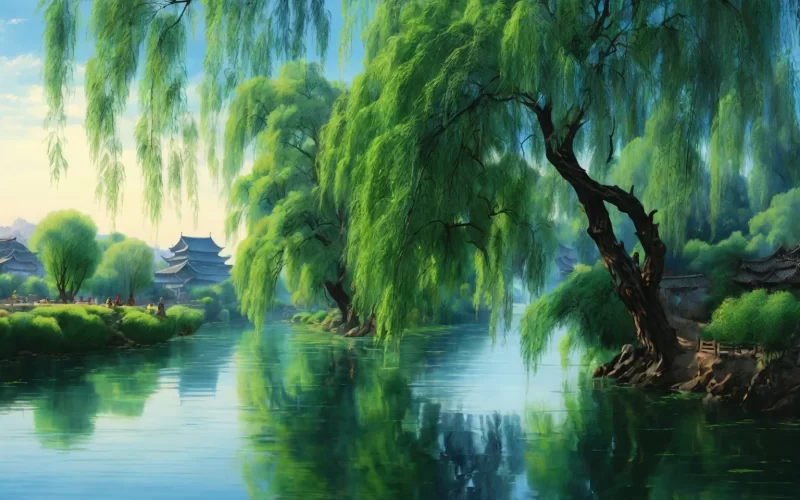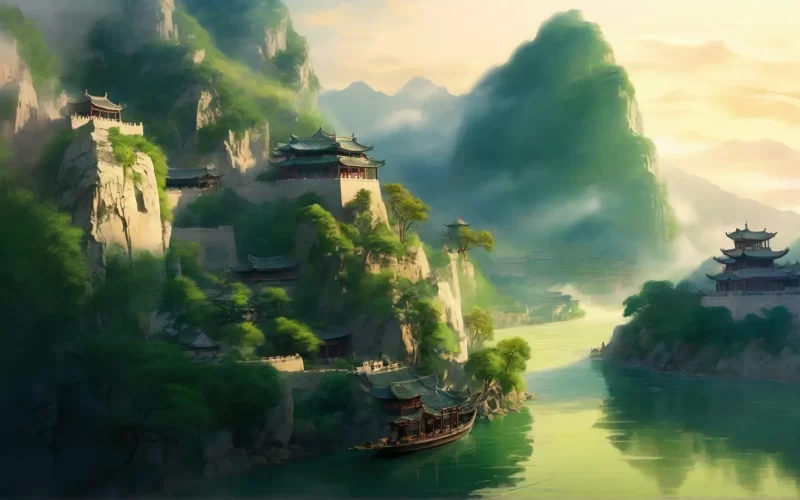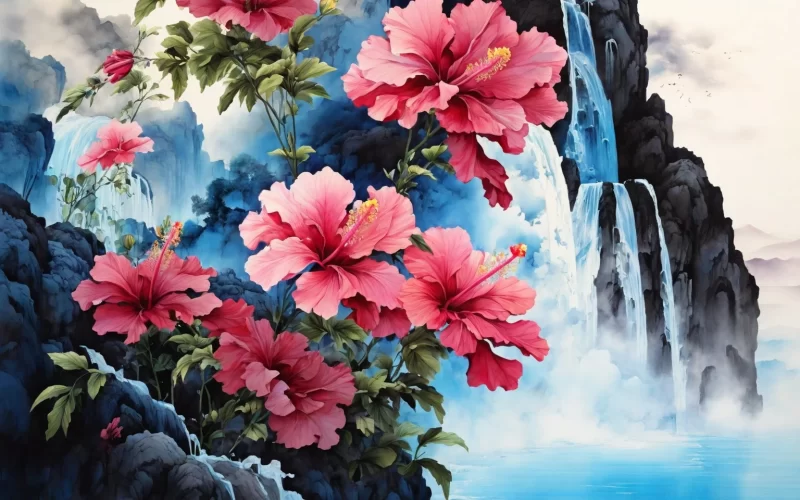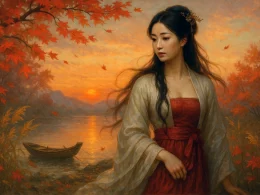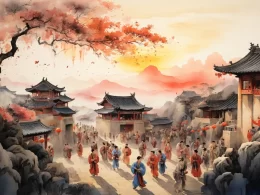Hermosos árboles se alzan
en hileras diferentes.
En el cristal de las olas
se invierten sus sombras.
Una imagen nunca vista
en los canales del palacio,
donde el viento de primavera acrecienta
la pena de las despedidas.
Texto original
「柳浪」
王维
分行接绮树,倒影入清漪。
不学御沟上,春风伤别离。
Antigua práctica
Este poema fue compuesto durante la juventud de Wang Wei (alrededor de los primeros años de la era Kaiyuan), y muestra los distintivos rasgos de su poesía temprana: frescura, brillo húmedo, y expresar sentimientos a través de objetos. A diferencia de la etérea y zen tranquilidad de sus poemas tardíos de Wangchuan, esta obra, al tiempo que pinta un paisaje fresco, plasma la comprensión única del joven poeta sobre las emociones de la despedida y su búsqueda de trascendencia. Las "olas de sauce" del poema aluden tanto a la imagen visual de hileras de sauces como olas, como contienen sutilmente el motivo tradicional del "sauce quebrado para la despedida". Sin embargo, mediante un giro ingenioso, Wang Wei imbuye a este tema tradicional de un significado nuevo, fresco, exquisito, racional y filosófico.
Primer pareado: «分行接绮树,倒影入清漪。»
Fēn háng jiē qǐ shù, dào yǐng rù qīng yī.
En hileras se unen, árboles espléndidos como brocado; / Sus reflejos se hunden en ondas claras y serenas.
Con ojo de pintor para la composición, el poeta destaca la belleza de la disposición de los sauces y el juego de luces y sombras. "En hileras" describe la plantación ordenada y alineada de los sauces, a la vez que sugiere sutilmente las filas de gente o carruajes durante una despedida, otorgando al paisaje natural una tenue conexión con los asuntos humanos. "Árboles espléndidos como brocado" utiliza la "seda labrada" como metáfora para describir el follaje exuberante y bello de los sauces, enfatizando su riqueza visual y textura. "Sus reflejos se hunden en ondas claras y serenas" expande aún más las capas espaciales: las pequeñas ondas en la superficie del agua hacen que los reflejos ondeen vivamente, mientras la luz del cielo y los colores de los árboles se funden con las olas cristalinas y las sombras acuáticas, creando una imagen cautivadora donde lo de arriba y lo de abajo se reflejan, lo tangible y lo intangible se engendran mutuamente. Estos dos versos describen puramente el paisaje, pero establecen silenciosamente el elegante trasfondo para una escena de despedida —libre de tristeza, lleno solo de belleza natural y luminosa.
Segundo pareado: «不学御沟上,春风伤别离。»
Bù xué yù gōu shàng, chūn fēng shāng bié lí.
No imitaré a aquellos junto al Canal Imperial, / Donde la brisa primaveral duele por la separación y la partida.
Aquí, el trazo poético da un giro, pasando de la escena a la emoción, y dentro de la emoción revela determinación. "Canal Imperial" se refiere a la vía fluvial que atraviesa el palacio imperial; los sauces en sus orillas fueron a menudo lugares de despedida en la capital, acumulando profundas connotaciones culturales de despedida dolorosa desde la dinastía Han. Las cinco palabras "la brisa primaveral duele por la separación" condensan innumerables tradiciones poéticas de romper ramas de sauce para despedirse y de brisas primaverales que añaden pesar. Sin embargo, Wang Wei usa el decisivo "No imitaré" para trazar una línea clara, expresando su renuencia a sumirse en ese estado de ánimo de despedida, formulaico y de pena por la pena misma. Esto no es falta de sentimiento, sino más bien una claridad racional y autonomía emocional —el poeta reconoce la realidad de la separación, pero se niega a estar atado por los patrones emocionales tradicionales, esperando encontrar una manera más desapegada de enfrentarla dentro de la belleza de la naturaleza y la claridad del corazón.
Análisis Integral
Esta es una obra hábil que toma prestado el sauce para innovar, usando el paisaje para disipar la pena. Todo el poema emplea una estructura de "lo positivo y lo negativo se complementan": el primer pareado describe exuberantemente la belleza de las olas de sauce, mientras el segundo niega la asociación tradicional del sauce con la pena; el primer pareado es una inmersión visual y sensorial, el segundo es una reflexión, una trascendencia racional. El poeta parece decir: Mira, el sauce puede estar tan lleno de vitalidad, su luz y sombra tan claras —¿por qué siempre debe cargar con la pesada carga del dolor de la despedida?
Este enfoque refleja la búsqueda poética del joven Wang Wei de heredar la tradición y al mismo tiempo esforzarse por trascenderla. No evita el vínculo cultural entre "sauce" y "despedida", pero al describir la belleza exuberante propia del sauce ("árboles espléndidos") y situarlo dentro del contexto claro y fluido de la naturaleza ("ondas claras y serenas"), primero dota al "sauce" de un valor estético independiente y autosuficiente, luego usa "No imitaré" para declarar su postura emocional elegida. Así, las olas de sauce ya no son meramente un símbolo de la partida, sino una manifestación de la belleza siempre renovada de la naturaleza; la despedida ya no es solo un acontecimiento triste, sino un proceso vital que puede ser contemplado racionalmente y aliviado por la belleza natural.
Recursos Estilísticos
- Selección y Reconstrucción de la Imagen: Wang Wei elige la imagen dinámica de "olas de sauce", que se ajusta al contexto de la poesía tradicional de despedida, pero limpia sus matices de dolor mediante un léxico fresco como "en hileras", "árboles espléndidos" y "ondas claras", reconstruyendo su belleza vívida como escena natural.
- Uso Negativo de la Alusión: "Sauces junto al Canal Imperial" es una alusión común a la despedida en la poesía. El uso de "No imitaré" por parte de Wang Wei constituye una "alusión negativa o inversa", resaltando su actitud emocional única mediante el contraste y profundizando el significado poético a través de este giro.
- Captura Sutil del Color y la Luz: El carácter "brocado" (绮) implica el verde esmeralda denso y la luz moteada de las hojas de sauce, mientras que "ondas claras y serenas" (清漪) transmite la transparencia y el movimiento de la luz sobre el agua, creando conjuntamente una atmósfera visual brillante y fluida, distinguiéndose intencionalmente de los tonos sombríos de los poemas de despedida tradicionales.
- Contención y Sublimación de la Expresión Emocional: Todo el poema no expresa directamente el dolor de la separación en una sola palabra; incluso rechaza explícitamente "doler por la separación". Sin embargo, a través de la apreciación del bello paisaje y el distanciamiento de las viejas convenciones, revela un mundo emocional más profundo y autónomo —una inmersión sincera en la belleza natural y una defensa de la dignidad emocional personal.
Reflexión
Esta obra nos muestra una sabiduría para reconciliarse con la emoción. Ante el eterno desafío humano de la separación, Wang Wei ofrece un tercer camino distinto de sumirse en la pena o reprimirla por la fuerza: asentar el corazón en la belleza de la naturaleza, mantener la claridad a través de la reflexión cultural. Nos muestra que el sauce puede ser un símbolo de la partida, pero ante todo, es un árbol de glorioso esplendor en primavera, un claro reflejo en el agua; la despedida puede ser dolorosa, pero no tenemos por qué estar atados por guiones culturales fijos. Podemos recorrer nuestro propio camino emocional con ojos que aprecian la belleza y un corazón claro.
En nuestra era actual, donde la expresión emocional es cada vez más formulada e incluso moldeada por narrativas de redes sociales, el "No imitaré" de Wang Wei es especialmente valioso. Nos recuerda: el sentimiento genuino brota de la experiencia interior, no de la imitación de fórmulas externas. Como el poeta, podemos encontrar en las "olas de sauce" y las "ondas claras" de la vida un modo de expresión emocional que sea tanto sincero como libre, tanto sentido en profundidad como luminoso. Esta no es solo la elección del corazón de un joven poeta de hace más de un milenio, sino también una revelación suave para cada individuo moderno.
Traductor
Chen Guojian(陈国坚)
Sobre el poeta

Wang Wei (王维), 701 - 761 d.C., era natural de Yuncheng, provincia de Shanxi. Wang Wei era un poeta de paisajes e idilios, y ésta es la impresión general que hoy en día se tiene de él y de sus poemas. Sus poemas de paisajes e idilios son de gran alcance en su imaginería y misteriosos en su significado, pero Wang Wei nunca llegó a ser realmente un hombre de paisajes e idilios.






